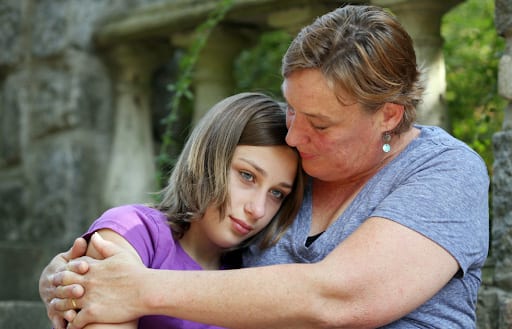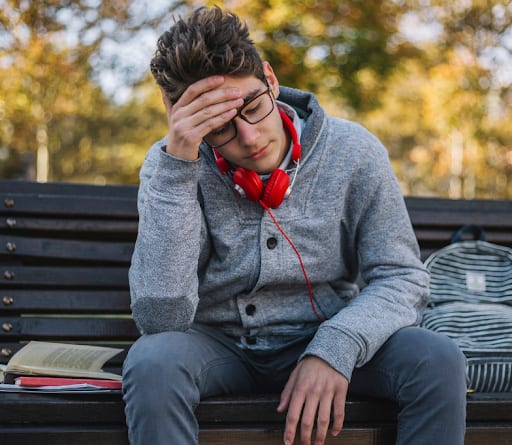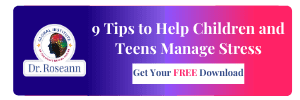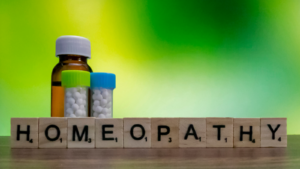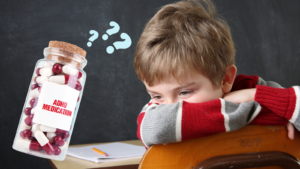Anxiety in children is different than anxiety in adults, and why is that? Well, kids show more behavioral symptoms than adults do because they just don’t have the words to connect what their body is telling them with how they’re actually feeling. With children, they often display physical symptoms of anxiety. These symptoms can wax and wane, as well as show up at different points.
Emotional and Behavioral Signs of Anxiety:
- Excessive worry
- Trouble going to sleep or staying asleep
- Frequent nightmares
- Fatigue
- Difficulty concentrating
- Irritability
- Overly sensitive
- Cries easily and frequently
- Emotional lability (up and down emotionally)
- Anger or rage
- Long tantrums or meltdowns
- Lack of self-confidence
- Fearfulness
- Phobias
- Separation anxiety
- Constantly seeks approval
- Rituals, compulsions, obsessions
- Perfectionistic tendencies
- Rigidity
- Negative talk or a tendency to think the worst
- Sensory processing difficulties
- Social avoidance or difficulties
- Attention or focus problems
- Gets distracted by worried thoughts
- Fear of speaking in public or to strangers
- Low frustration tolerance
- Frequent erasing of work
- Won’t turn in school work
- Test anxiety
- Avoids new experiences
- Says, “No” all the time
- Worries about things in the future
- Hyperverbal looping of worries (e.g., says “Why did she do that” over and over)
Physical Signs of Anxiety:
- Muscle tension
- Difficulty relaxing
- Physical pain
- Headaches
- Stomach aches
- Red face in social situations
- Hives or skin conditions (unexplained)
- Hair loss (unexplained)
- Excessive sweating
- Holding of bladder or bowels
- Frequent urination
- Hyperactive behavior
- Sleep problems
Stressors that Lead to Anxiety
One of the hardest things for adults to understand about childhood anxiety is that a situational stressor, something stressing a child out, does not have to actually occur. Anxiety can build in anybody for any reason, there doesn’t have to be a rational basis for something that is worrying us.
Parents often wonder, why is my kid anxious? Well we’re living in a really stressful world and anxiety builds. We all feel it, and so do our kids. It could be having lights on in a classroom all day, or sitting next to a kid who makes noises, all kinds of things. These issues can be real or perceived. Our body knows no difference between something that is real or imagined, and it also doesn’t know the difference between good stress and bad stress, which can build within the body and cause anxiety.
To learn more about stress and how to help your child build coping skills, read my blog, How does stress affect your child
Distinguishing Between Anxiety and ADHD
It’s fairly hard to distinguish between symptoms of ADHD and an anxiety disorder. With kids who are really struggling with anxiety, if they are in a worried looping thought pattern, they are just not able to concentrate. It’s really important to spend time to figure out what’s going on.
The Impact of Anxiety
Anxious kids might also show rage, which is particularly the case with teenagers. There are really anxious kids who are unable to connect with their emotions or articulate how they’re feeling, or maybe they just feel really uncomfortable, and that’s the way that rage can come out.
Anxiety can showcase itself in a lot of different ways and can impact learning, tension, and emotional regulation.
How Neurofeedback Has Helped
I remember one boy who was just a special kid who had a lot of love in his heart. He was a top student. He got stomach pains, and then they turned into vomiting, which eventually led to him vomiting every day. This caused his mom to take him to a medical provider to get help. They did every thorough analysis you could imagine, and finally the doctor intuitively said it was anxiety or stress. The doctor called me up and asked if I thought neurofeedback could help him.
Neurofeedback did help him, and from that point on he never threw up again. His mom had said that he didn’t like to be cuddled or snuggled before neurofeedback, and once we rested his nervous system, he became much calmer. What to take from this is that physical anxiety can show up in a lot of different ways and we should never ignore that.
Dr. Ro’s No
Don’t assume your child can’t have clinical anxiety. Parents often assume that their child couldn’t be clinically anxious because they have a good life and are being provided for and loved. Anxiety can creep up on anybody, of any age. In fact, the average age of onset for an anxiety disorder is age six.
Just like adults, kids are anxious. One of the biggest trends I’m seeing is more and more cases of anxiety for children and teens popping up. This is a serious issue and a national crisis. Don’t assume because you are an awesome parent or that your child is getting good grades that they don't have clinical anxiety. It’s one of the biggest uh-oh’s happening with parents today.
Dr. Ro’s Go
Role model stress management. One of the biggest gifts we can give to our children is being a good leader in times of trouble and how we parent make a difference. Our kids are sponges, and modeling stress management really helps them to develop their own skills of their own.
Focus on lifestyle changes and use your child’s anxiety to role model all of those beautiful things you are doing for yourself every day. Particularly as moms, we often see self care as a luxury yet it is actually so important for your own mental health. Taking as little as 10 minutes every day to do activities like yoga or meditation with your child are things that are not only stress inoculators, but are also teachable moments. When your child learns tools to cope with stress, they are more likely to handle things better in the future.
What we say really makes a difference and when you have an anxious child, you may never know what the right thing to say is! I created a FREE download for you to help you navigate talking to an anxious child called, 5 Things You Should Never Say to a Child With Anxiety.
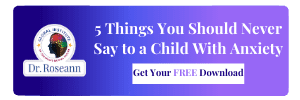
Dr. Ro’s Biggest Go
If you see signs of anxiety, get help. It takes an average of 11 years from the onset of a mental health problem for a child to get help. That is a research-based statistic which is startling but accurate. Anxious people can be really functional and if you’re anxious you know what I’m talking about. Kids can be doing very well in school, and still have a lot of worries.
These are all things that can be addressed and changed with the help of a mental health professional, and you can find them anywhere in the United States. We also have teletherapy nowadays. As an expert in teletherapy I wrote my first-of-its-kind book the Teletherapy Toolkit™ which is full of fun and engaging activities that parents, educators, and therapists all over can do with anxious kids today. Research also tells us that teletherapy is just as effective as therapy that happens in person, so feel confident that your child is getting the best care. Also keep in mind that nobody ever regrets getting help, they only regret when they don’t.
Looking for more tips and tools to support your anxious child or teen? Get the FREE Download 9 Tips To Help Children and Teens Manage Stress
Are you looking for SOLUTIONS for your struggling child or teen?
Dr. Roseann and her team are all about solutions, so you are in the right place!
There are 3 ways to work with Dr. Roseann:
- In-person at her Ridgefield, CT center
- Virtually with her home-based neurofeedback and coaching programs
- By joining her Raising Successful Kids Community
You can get her books for parents and professionals, including: It’s Gonna Be OK™: Proven Ways to Improve Your Child’s Mental Health, Teletherapy Toolkit™ and Brain Under Attack: A Resource For Parents and Caregivers of Children With PANS, PANDAS, and Autoimmune Encephalopathy.
Are you a professional who wants more training from Dr. Roseann?
Sign up for her Professional Webinars and CE-Based Coursesor purchase her book, Teletherapy Toolkit™: Therapist Handbook for Treating Children and Teens.
If you are a business or organization that needs proactive guidance to support employee mental health or an organization looking for a brand representative, check out Dr. Roseann’sprofessional speaking page to see how we can work together.
Dr. Roseann is a Children’s Mental Health Expert and Therapist who has been featured in/on hundreds of media outlets including, CBS, NBC, FOX News, PIX11 NYC, The New York Times, The Washington Post,, Business Insider, USA Today, CNET, Marth Stewart, and PARENTS. FORBES called her, “A thought leader in children’s mental health.” She is the founder and director of The Global Institute of Children’s Mental Health and Dr. Roseann Capanna-Hodge. Dr. Roseann is a Board Certified Neurofeedback (BCN) Practitioner, a Board Member of the Northeast Region Biofeedback Society (NRBS), Certified Integrative Medicine Mental Health Provider (CMHIMP) and an Amen Clinic Certified Brain Health Coach. She is also a member of The International Lyme Disease and Associated Disease Society (ILADS), The American Psychological Association (APA), Anxiety and Depression Association of America (ADAA) National Association of School Psychologists (NASP), International OCD Foundation (IOCDF) International Society for Neurofeedback and Research (ISNR) and The Association of Applied Psychophysiology and Biofeedback (AAPB).
© Roseann-Capanna-Hodge, LLC 2021

